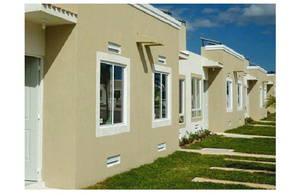Nationally Appropriate Mitigation Actions (NAMA) Facility
How the International Climate Fund is working with developing countries to implement Nationally Appropriate Mitigation Actions (NAMAs).

Mexico sustainable housing pilot project
Background
The Nationally Appropriate Mitigation Actions (NAMA) Facility was launched by the UK Department of Energy and Climate Change (DECC) and the German Federal Ministry for the Environment, Nature Conservation, Building and Nuclear Safety (BMUB) in December 2012.
Theme: Mitigation
This project supports mitigation by providing funding to the most transformational parts of NAMA plans. NAMAs are concrete projects, policies, or programmes that shift a technology or sector in a country onto a low-carbon development trajectory.
Context
The concept of NAMAs was developed in the context of the international negotiations under the United Nations Framework Convention on Climate Change (UNFCCC). NAMAs are considered to be voluntary climate protection measures taken by developing countries, which are embedded within their national development plans. By moving countries towards a low-carbon development trajectory, NAMAs have the potential to significantly contribute to global efforts to reduce greenhouse gas (GHG) emissions. Simultaneously, they offer developing countries and emerging economies a framework for combining broad-based climate action with the achievement of sustainable development goals. This concept is gaining momentum as many developing countries are already developing NAMAs in the context of their national development strategies and plans.
What is being done?
This project focuses on those parts of NAMA plans that are stretching and aspirational and are pushing to do much more than business as usual to mitigate the impacts of climate change. NAMA projects are selected for support through an open and competitive process, which ensures that the best projects from around the world go forwards.
£75m of UK funding has been committed so far over two project calls, one in 2013 and one in 2014. The German government have matched the UK’s contribution.
In the first call in 2013, 47 project proposals were received. Funding was pre-approved for the following four projects: * Chilean Self-supply Renewable Energy (SSRE) NAMA * Colombia Transit-oriented Development NAMA * Costa Rica Low Carbon Coffee NAMA * Indonesia Sustainable Urban Transport Program (SUTRI NAMA)
The first project for support has been announced; a pilot project in Mexico on sustainable housing. This aims to extend penetration of basic energy efficiency standards to the entire new housing market in Mexico, at the same time as upgrading those energy efficiency standards to more ambitious levels.
Expected Results
This Facility is providing a clear political signal that donor countries will support potentially transformational NAMAs. It is expected to demonstrate how transformational parts of projects could be targeted for support in a range of sectors and countries in the short term, when it is needed, and will draw out learning about these types of projects to apply across the board to other transformational investments. The project is an opportunity for donor countries to demonstrate a proactive approach.
Further information
- Website of the NAMA Facility for further information and details of how to bid
- Email of the Technical Support Unit for the NAMA Facility, who can answer further questions, at contact@nama-facility.org
- First annual review of the ICF support for the NAMA Facility
- Second annual review of the ICF support for the NAMA facility
Updates to this page
-
Case study updated and second annual review published.
-
Information about the Nationally Appropriate Mitigation Actions (NAMA) Facility, including a template for applications to the bidding process and details of eligibility criteria have been added.
-
First published.